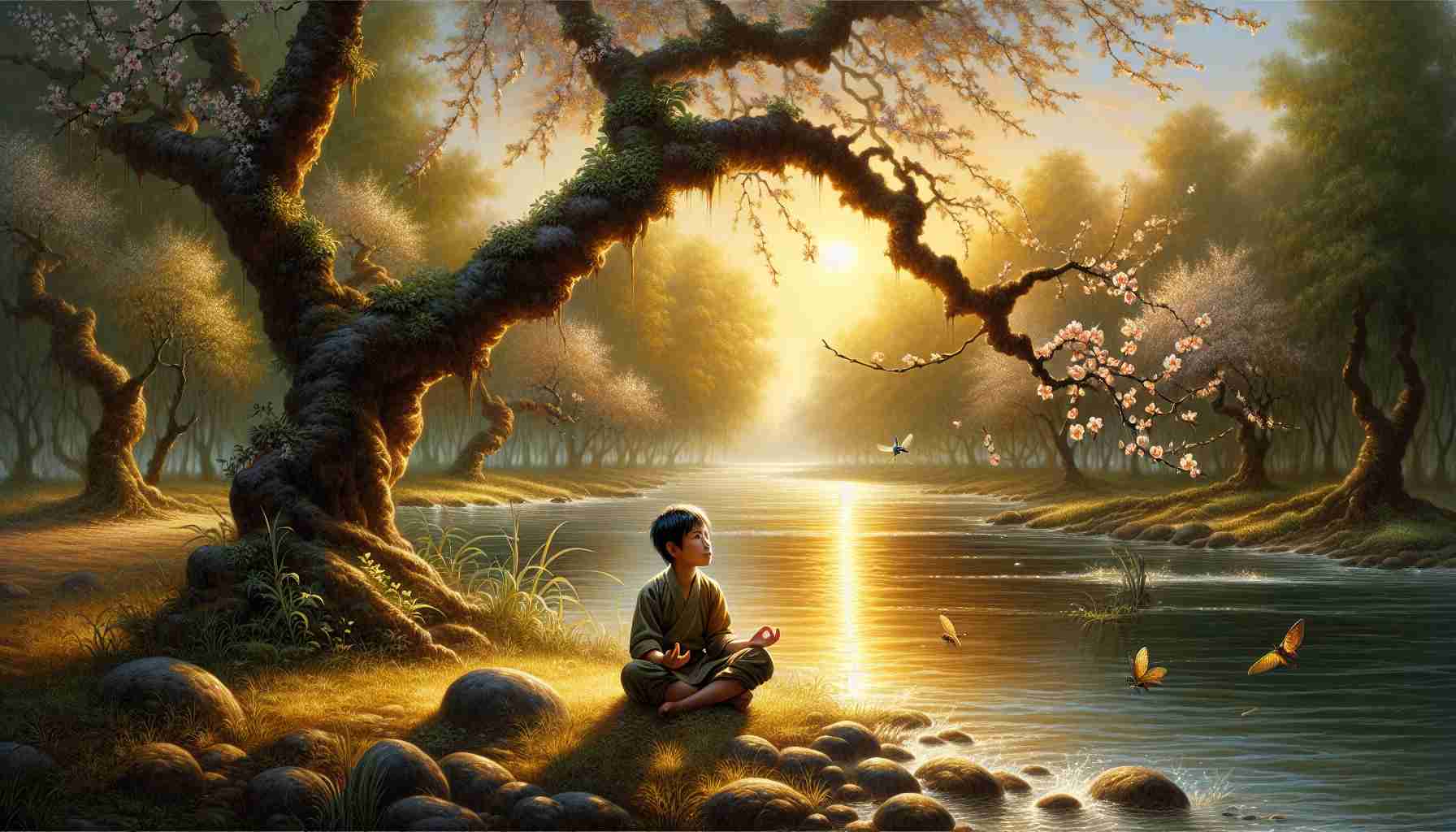

The day the river stopped whispering, I knew something was changing. My name is Wei, and I was only ten summers old when I began to wait.
Our village sat nestled between tall mountains and lazy curves of the Li River. The adults bustled like ants, busy from sun-up to sundown. But I—I just waited.
It started when my grandfather, Old Bo, told me about the Tao.
“The Tao,” he said, his eyes like still ponds, “is the Way. Don’t chase it. Let it come to you, like mist on the morning grass.”
I didn’t understand. So, I asked, “How will I know when the Tao has come?”
Old Bo only smiled. “Wait and see.”
So I did. I waited by the river, where birds dipped and dragonflies spun silver trails. I waited by the plum tree, where blossoms bloomed without asking. I watched ants carry grains bigger than their heads, always calm, never hurried.
At first, the others laughed. “Still waiting, little Wei?” the baker would tease, wiping flour from his beard.
“Yes,” I’d say. “Grandfather told me the Tao would reveal the Way.”
The older boys rolled their eyes. "You’ll wait forever."
Maybe I would. But something strange began to happen. I noticed things. How the breeze didn’t push—it followed the shape of the land. How fish darted swiftly not by force, but by flow. I watched how silence between words carried more than the words themselves.
One day, a traveling merchant came to our village with scrolls, silks, and sharp-edged toys. Children ran to him, eyes wide, fingers pointing.
I stayed by the tree.
He noticed me and chuckled. “Boy, don’t you want a sword or a treasure?”
I shook my head. “I am waiting for the Tao.”
He sat beside me. “And how will it come?”
I shrugged. “I don’t know. But I think it already is.”
He raised an eyebrow. “Explain.”
I thought for a moment. “The river doesn’t rush, but it always reaches the sea. The tree doesn’t move, but its shade is everywhere. I think the Tao is like that.”
He stared at me a long time, then nodded slowly. “Zhuangzi once wrote of a man who dreamed he was a butterfly. But maybe he was the butterfly dreaming he was a man."
I smiled. I liked that.
The merchant left. The village stayed busy. But I stopped needing to wait. I began to walk with the wind, sleep when tired, move only when moved. I didn’t do less—I just stopped pushing.
Years later, when I was old and children gathered at my feet, they asked, “Master Wei, how did you find the Tao?”
I smiled, like Old Bo once had, and said, “By learning that I didn’t need to look for it. I only needed to see.”
I never stopped learning after that. The Tao isn’t something you catch. It’s something you let be.
And that was the day I understood: waiting wasn’t about holding still. It was about letting go.
The day the river stopped whispering, I knew something was changing. My name is Wei, and I was only ten summers old when I began to wait.
Our village sat nestled between tall mountains and lazy curves of the Li River. The adults bustled like ants, busy from sun-up to sundown. But I—I just waited.
It started when my grandfather, Old Bo, told me about the Tao.
“The Tao,” he said, his eyes like still ponds, “is the Way. Don’t chase it. Let it come to you, like mist on the morning grass.”
I didn’t understand. So, I asked, “How will I know when the Tao has come?”
Old Bo only smiled. “Wait and see.”
So I did. I waited by the river, where birds dipped and dragonflies spun silver trails. I waited by the plum tree, where blossoms bloomed without asking. I watched ants carry grains bigger than their heads, always calm, never hurried.
At first, the others laughed. “Still waiting, little Wei?” the baker would tease, wiping flour from his beard.
“Yes,” I’d say. “Grandfather told me the Tao would reveal the Way.”
The older boys rolled their eyes. "You’ll wait forever."
Maybe I would. But something strange began to happen. I noticed things. How the breeze didn’t push—it followed the shape of the land. How fish darted swiftly not by force, but by flow. I watched how silence between words carried more than the words themselves.
One day, a traveling merchant came to our village with scrolls, silks, and sharp-edged toys. Children ran to him, eyes wide, fingers pointing.
I stayed by the tree.
He noticed me and chuckled. “Boy, don’t you want a sword or a treasure?”
I shook my head. “I am waiting for the Tao.”
He sat beside me. “And how will it come?”
I shrugged. “I don’t know. But I think it already is.”
He raised an eyebrow. “Explain.”
I thought for a moment. “The river doesn’t rush, but it always reaches the sea. The tree doesn’t move, but its shade is everywhere. I think the Tao is like that.”
He stared at me a long time, then nodded slowly. “Zhuangzi once wrote of a man who dreamed he was a butterfly. But maybe he was the butterfly dreaming he was a man."
I smiled. I liked that.
The merchant left. The village stayed busy. But I stopped needing to wait. I began to walk with the wind, sleep when tired, move only when moved. I didn’t do less—I just stopped pushing.
Years later, when I was old and children gathered at my feet, they asked, “Master Wei, how did you find the Tao?”
I smiled, like Old Bo once had, and said, “By learning that I didn’t need to look for it. I only needed to see.”
I never stopped learning after that. The Tao isn’t something you catch. It’s something you let be.
And that was the day I understood: waiting wasn’t about holding still. It was about letting go.